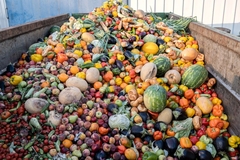
- Industry news
Industry news
- Category news
Category news
- Reports
- Key trends
- Multimedia
- Journal
- Events
- Suppliers
- Home
- Industry news
Industry news
- Category news
Category news
- Reports
- Key trends
- Multimedia
- Events
- Suppliers
COP30: Only 30 countries commit to food waste mitigation as climate pressure mounts
Key takeaways
- Only 30 countries include food waste reduction in their COP30 climate plans.
- NGOs warn food waste drives major emissions, but has ready solutions.
- Cutting waste offers fast climate wins and strengthens food security.

Just 30 countries attending COP30 have made commitments to tackle food loss and waste in their Nationally Determined Contributions (NDCs), up by only six since COP29, despite food waste being responsible for around 10% of all global GHG emissions.
Leading food loss and waste NGOs WRAP, ReFED, and The Global FoodBanking Network are co-hosting a half-day of action at COP30 today dedicated to addressing food waste as an invisible driver of climate change.
With global food waste ranking third behind China and the US in terms of emissions, the organizations warn that neglecting its enormous impact risks undermining efforts to mitigate the worst impacts of climate change.
With countries struggling to address climate change, action on food waste offers a quick win, the organizations say, as the solutions exist and offer co-benefits for the economy and food insecurity. Tackling food waste quickly mitigates a significant number of emissions, buying extra time to address other systemic issues.
Catherine David, CEO at WRAP, says: “To build a truly sustainable food system, we must rethink how we value food, from farm to fork and beyond. Reducing food waste is one of the fastest, most practical ways to cut emissions, ease pressure on supply chains, and make better use of the resources we already have.”
She notes that a circular approach to food is essential to creating a more resilient future, with food waste reduction contributing directly to achieving Sustainable Development Goals on climate, hunger, and sustainable production.
NDC commitments insufficient
WRAP’s evaluation shows that 30 countries committed to reducing food loss and waste in their NDCs for COP30 as of October 29, 2025, including seven that commit to tackling both.
Current NDC commitments put the world on track for 4-5°C of warming, far beyond the UN Paris Agreement goal, and the latest World Resources Institute Climate Action report shows that none of their 45 indicators are on track to reach 1.5°C targets this decade.
“Reducing food waste offers so many benefits — for the climate, for economies, and for communities in need — which is why it’s so important for countries to include food waste reduction in their NDCs and climate plans,” says Dana Gunders, president at ReFED.
“Lots of food waste solutions already exist and are ready to be implemented. Making that commitment is the first step to taking action.”
David highlights that Brazil’s new intersectoral strategy shows that even major food-producing countries can embed food waste reduction across national policy, while others like Colombia, Chile, and Indonesia are linking these actions to methane reduction, food security, and circular economy goals.
Food banking as a dual solution
Lisa Moon, president and CEO of The Global FoodBanking Network, says: “A growing number of countries are including food loss and waste in their NDCs, and highlighting food banking as a solution that can simultaneously reduce methane emissions and alleviate hunger.”
She emphasizes the need to build on this progress, encouraging more countries to include food loss and waste reductions in their climate plans so they can seize the opportunity to feed more people with good food while reducing waste and protecting resources.
Cutting food loss and waste improves food security, reduces household costs, and supports rural livelihoods, especially in developing countries. The NGOs believe COP30 must be the moment when every country puts food loss and waste reduction at the center of its climate plan.
To raise awareness of the huge shortfall in countries committing to tackling food loss and waste in their NDCs, the organizations held a dedicated half-day of action at COP30 in the Blue Zone's Action on Food Hub on November 12, featuring leading international voices on food system transformation.











